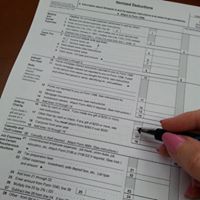 New Year’s Day brings a celebration of new beginnings, but it also rings in a new tax season. For many, the rush is on to file their income tax return at the earliest possible moment. Most likely this is due to the promise of a large tax refund.
New Year’s Day brings a celebration of new beginnings, but it also rings in a new tax season. For many, the rush is on to file their income tax return at the earliest possible moment. Most likely this is due to the promise of a large tax refund.
Yes, it is good to get your tax refund quickly so you can use it to pay down bills or add to your investments. But not if your haste causes you to file an incorrect tax return. This could be costly in the long run.
Tax Return Filing – Why Should I Wait?
What kind of problems might be created with a tax return filed in a rush? Here are the most common issues:
Unreported Income
In the rush to file, it is easy to forget that you worked a couple of weekends at a second job, earned some interest on an account that you closed last year, or that you sold a small amount of stocks a year ago. Many companies wait until the deadline (usually Jan 31st) to issue the respective W-2’s or 1099s. You might not receive the necessary tax forms until well after the 1st of February. For forms other than 1099-MISC and W-2’s the company may request an extension of time to file which would further delay your receipt of the forms.
Forgotten Deductions
Recent tax laws increased the standard deduction. However, if you have a large or high interest rate mortgage, large donations to charity, paid large medical bills, or paid a large amount of state and local taxes, you should check to see if you still might be able to itemize deductions. If you can, then slow down and carefully check your receipts and bank account registers for deductible expenses that you may have overlooked.
This is even more important for the small business owner with Schedule C (self-employment) income. Check your personal accounts for business expenses you paid that have not yet been posted to your books.
Even without itemizing, there are deductions that can be taken, such as education expenses, self-employed health insurance deductions, and deductions for contributions to traditional IRA accounts.
 Unclaimed Credits
Unclaimed Credits
Overlooking credits can leave a lot of money on the table – thousands of dollars in some cases. Education credits, earned income tax credits, energy saving materials credits, credits for foreign taxes paid from stock and mutual funds, child tax credits, and child care expenses credits are some of the credits that can be overlooked when you are in a hurry to file.
Incorrect Number of Exemptions for Dependents
The deduction for dependency exemptions has been eliminated, but the other benefits from claiming a dependent are still strongly in place. You could miss out on education credits, child tax credits, medical deductions, higher thresholds for health savings accounts, and higher earned income tax credits.
On the other hand, you could also claim a dependent that you are not qualified to claim. For example, say you trade your child’s exemption claim every other year with an ex-spouse. If in your haste you claim the exemption in the wrong year, yes you might get the extra benefits on the tax return. But it is highly likely that you will pay back that tax benefit either to the IRS (plus penalty and interest) or to the ex-spouse when they demand it, or worse, when they take you to court to correct it (add in your attorney fees to that one.)
Missing Beneficial Tax Moves
Up until the due date of your Federal tax return, you can still consider a prior year deductible contribution to your traditional IRA account or your HSA account. However if you file the return early and then realize that you want to make the prior-year contribution, your only recourse is to make the timely contribution and then file an amended tax return to claim it.
If you are eligible to contribute to an HSA account and you have out-of- pocket medical bills coming up, it is financial insanity to not consider making a tax-deductible contribution to your HSA and then using that same money to pay the medical bill. Bingo. You just found a roundabout way to take a tax deduction for a medical expense even if you don’t have enough to itemize.
Overlooking Last Minute Tax Changes
We are living in an age where the government seems to regularly pass tax laws just before or after Jan 1st. If you file too early, the tax forms might not even reflect the tax changes that were just made.
This could cause you to miss a deduction or credit (like the recently revived credit for adding insulation or energy-efficient windows to your home). It could also cause your tax return to go into a multi-week hold because the tax changes affected a small line item on your tax return and the IRS can’t process your return until their software is updated.
IRS Early Tax Season Tweaks and Woes
The IRS spends the last part of the year converting their software to the new tax year, updating for new legislation and regular yearly changes, as well as training their full time and temporary staff how to use the software, run the systems, and become knowledgeable about the new tax year’s laws and changes. Will the first week of filing be perfect? Nope. As hard as they have worked, there will be glitches, stalls, changes, quick revisions, and updates as the new tax year begins to roll. Early filers can easily get caught in these errors and delays of tax season start up. Waiting just a week or so while the new system is tested may make filing your tax return a much smoother process.
Is It Ever Smart to File a Tax Return in January?
Of course it is. Just don’t file in a big, careless rush. Go back through your calendar to remind yourself of jobs, events, or expenses that might affect your return. Carefully check all parts of the tax return and double check that you have received all of your tax forms and taken advantage of all eligible credits and deductions.
About the author: Patti is a CPA and has a CPA firm in Elkhart IN. Her firm offers tax and accounting services to individuals and small businesses.
